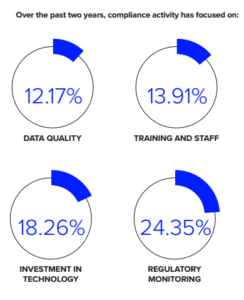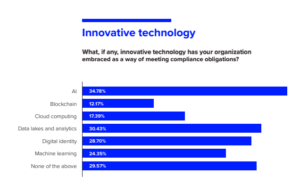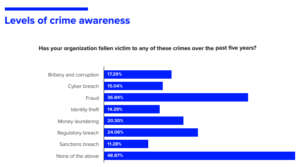Refinitiv Releases Findings Of MENA Financial Crime Survey For 2020
Refinitiv today released the sixth edition of the Middle East and North Africa (MENA) Financial Crime Survey for 2020 featuring new regional compliance trends investment in data, adoption of Ultimate Beneficial Ownership (UBO), and deployment of digital ID programs.
According to the findings this year, more than 60 percent of respondents recognise building data management and analytical capabilities as a priority, 53 percent indicate that local corporations have adopted UBO, and 29 percent confirm the presence of a digital ID program. In respect to sanctions programs and investment in compliance, 64 percent confirm they have a sanctions program in place, while 57 percent expect a substantial increase in compliance investment by regional countries.
Overall, 83 percent of organizations from across the region plan to dedicate more resources to compliance over the next two years. This year, Pakistan, Saudi Arabia, the United Arab Emirates, and Lebanon stand out for their strong focus on compliance activities and significant investment. Other countries that are making noticeable progress are Egypt, Algeria, Bahrain, Jordan and Qatar.
“Last year, the region witnessed a strong drive towards diversification, economic reforms, and an accelerated regulatory change. The private sector and financial institutions have been diligently aligning their governance, risk and compliance strategies with international best practice. That said, the report this year cites new and exciting trends that are promising for regulated organizations especially in terms of technology innovation, data management and due diligence awareness,” said Nadim Najjar, Managing Director, Middle East and Africa, Refinitiv.
“We believe this innovation is of critical benefit for MENA organizations as they manage all forms of digital risks during this challenging time following the COVID-19 outbreak. Now is the right time for MENA companies to deploy sound compliance programs, enhance efficiency, and ensure accuracy of customer due diligence. As internet usage surges, we are seeing all forms of crime impacting digital businesses. These compliance risks are not particular to financial institutions only, but are also affecting businesses that have a digital presence across industries such as health care, supply chain, retail, services, among others,” he noted.
The survey confirms that MENA start-ups are leading on deployment of effective data strategies, while larger organizations are realizing the value of their data and using data systems to scale their compliance programs. MENA compliance officers are realizing that high quality data is the foundation of a successful compliance program. The survey also indicates that data management is a challenge especially in relation to onboarding and monitoring. According to 24 percent of respondents, effective data management will be their biggest challenge over the next two years.
MENA’s AML-obliged entities are widening their understanding of the UBOs linked to their close business relationships. Responses show that technology and internal processes are priority areas for investment to meet compliance objectives especially in terms of adopting an efficient UBO practice.
According to the findings, about 25 percent of respondents cited KYC (Know Your Customer) as their primary challenge. The findings also confirm how identification has seen steady growth in the risk and compliance function over the years across MENA markets. Although the region has seen substantial investment in technology solutions, many organizations are still struggling with the management and screening of customer data.
Please click here to obtain a copy of the report.










 Email: info@cyber-gear.com
Email: info@cyber-gear.com